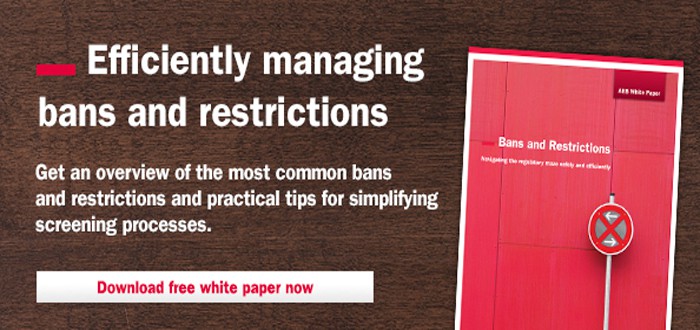-
ROSSLARE EUROPORT TARGETS HEALTH & SAFETY WITH CAMERA TELEMATICS PARTNERSHIP - 2 days ago
-
Landmark Study Reveals Wearable Robotics Significantly Boost Safety and Efficiency in Industrial Environments - July 24, 2024
-
Visku Tackle The Retail Seasonality Challenge One Pallet At A Time - July 22, 2024
-
KAMMAC AND BERGEN LOGISTICS STRENGTHEN FASHION & LIFESTYLE SERVICES IN THE UK - July 19, 2024
-
TENTBOX EXTENDS PARTNERSHIP WITH ARROWXL TO SUPPORT INCREASING DEMAND - July 17, 2024
-
The Perfume Shop improves customer journeys while driving profitability in partnership with Scurri - July 17, 2024
-
ZEROMISSION SECURES £2.3M ($3M) INVESTMENT TO ACCELERATE ELECTRIC FLEETS - July 16, 2024
-
BCMPA CELEBRATES SUCCESS OF 2024 CONFERENCE - July 15, 2024
-
Best of the Best: Jungheinrich Celebrates Triple International Award Win - July 12, 2024
-
GOPLASTICPALLETS.COM CALLS ON NEW CHANCELLOR RACHEL REEVES TO CONSIDER PLASTIC PACKAGING TAX REFORM - July 10, 2024
AEB releases new white paper with valuable tips for efficiently managing bans and restrictions.
Managing supply chains across borders, companies need to consider numerous global trade regulations. The new white paper “Bans and restrictions” by AEB, a leading provider of software and services for global trade and supply chain management, provides an overview of the most common bans and restrictions and offers tips for automating and simplifying screening processes through manual restrictions. It can be downloaded free of charge at www.aeb.com/uk/media/white-paper-bans-and-restrictions.php.
Bans and restrictions can grow into serious trade barriers unless businesses keep track of them and efficiently integrate them into their business processes. This is especially true in global trade, where compliance with complex national and international rules and regulations is a basic prerequisite for long-term success. But the effort required to run checks and obtain the necessary permits must remain manageable, otherwise businesses face an uphill struggle trying to match the lead times and costs needed to thrive in today’s highly competitive global marketplace.
But the broader the product portfolio and the more international the sales markets, the more complex the task of screening business transactions becomes. Many exporters deploy export control solutions that screen all ongoing business transactions against restricted party lists, national embargoes, restricted product lists, and designated use definitions.
Unfortunately, the full functionality of such software often goes unutilised. The same software can be used to reliably screen against bans and restrictions from other jurisdictions and countries and even define in-house restrictions, for example. Such functions can be programmed to run as manual restrictions alongside the software’s standard screening processes. Using IT to support the monitoring of these manual restrictions offers many benefits:
· Much lower processing times
· Lower personnel costs
· Streamlined processes
· Much greater transparency and legal protections in the screening process
To provide companies with a practical overview of the most common bans and restrictions, AEB has developed a new white paper. Titled “Bans and restrictions”, it offers tips and practical examples for automating and simplifying screening processes through manual restrictions. It can be downloaded free of charge at www.aeb.com/uk/media/white-paper-bans-and-restrictions.php.

































